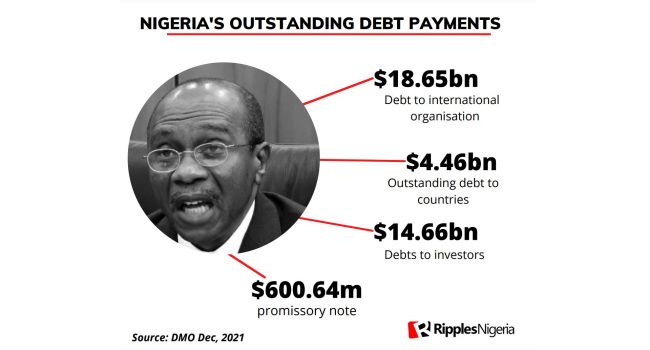Ripples Metrics
RipplesMetrics: How Nigeria spent $11.9bn repaying World Bank, IMF, other loans in 7 years

As the Federal government concludes the arrangement to take another $950 million loan from international investors, updated data from the Central Bank of Nigeria have revealed how much the country is stretched to repay its loan.
In March this year, Nigeria raised $1.25 billion, bringing the total amount of external debts to the World Bank, International Monetary Fund(IMF), countries, and investors to over $39.64 billion from $38.39 billion where it stood as of December 2021.
Confirming the new loan, despite the high-interest rate it could attract, Zainab Ahmed, minister of Finance, Budget and National planning, said, “For 2022, we have already issued early in this year, in March, $1.25 billion, and that means that the market is still very receptive to Nigeria. We still have about $950 million to issue, which should be in May.”
She also suggested that Nigeria could borrow more before the year ends.
“Later in the year, we would consider our options dependent on what the market looks like to determine whether we would need to go out to the market or not.”
The cost of servicing the loans
Despite the importance of loans to the Nigerian economy amid dwindling oil revenue, it remains a significant threat.
According to data from the Central Bank of Nigeria (CBN), between 2015 and January 2022, Nigeria spent $11.9billion to settle its foreign debt obligations.
CBN stated this in its updated international payment data published on its website.
Examination of the international payment data showed that from 2015 the amount paid to the World Bank, International Monetary Fund (IMF), and Exim Bank of China, among others, for debt service and payments, have continued to increase.
The debt repayments captured were made on behalf of the federal government alone, excluding 36 states and the Federal Capital Territory (FCT).
Ripples Nigeria analysis shows that CBN pays an average of $4.65 million daily and $141.6 million monthly on debt services during the seven years.
Yearly breakdown
On a year-year breakdown, CBN disclosed that the highest amount paid was $5.76 billion in 2020.
In 2015, CBN spent $378.9 million, which was reduced in 2016 to $349.6 million and in 2017 increased again to $444.7 million.
Everything changed in 2018 when the CBN began devoting billions of dollars to debt service payments on an annual basis.
The CBN committed to debt servicing $1.47 billion, $1.34 billion, and $2.12 billion in 2018, 2019, and 2021, respectively.
Monthly breakdown of 2021 external debt repayment
A month-on-month breakdown showed that the CBN in January spent $617.5 million to service debts; it dropped by 65.45 per cent to $213.3 million in February; and fell to $172.5 million in March.
In April, the CBN disclosed that $82.3 million was spent on debt service; it moved to $167.5 million in May, the apex bank’s second-highest amount spent on debt service in one month.
In June, the amount dropped to $49.4 million; it rose to $120.8 million in July. For August, September, and October, the figures reported by the CBN were $230.6 million, $169.2 million, and $85.2 million, respectively.
However, between November and December of 2021, the CBN revealed that $148.57 and $69.83million were spent on debt services and payments.
94% of 2022 revenue to go to debt servicing
Cash-strapped and faced with dwindling revenue, Nigeria’s debt repayment burden could get worst.
According to the 2022 budget, the Federal government has earmarked N1.1 trillion or over $2 billion for foreign debt servicing.
The CBN data show that the first payment of $101.2 million has been deposited into the account of foreign creditors. This amount is expected to increase in the coming months.
No thanks to the depreciation of the Naira to the dollar and dwindling revenue, primarily from oil.
The Nigerian government remains upbeat about the sustainability of its debt but August&Co, a global research and credit rating institution, has warned that Nigeria would incur N4.7 trillion on debt serving this year. The amount is 94 per cent of the N5 trillion 2022 revenue projection.
It could get worst
As earlier revealed, all is not well with the Nigerian economy, and in the Federal government’s quest to offset the debt, it would have to borrow even more.
Tejvan Pettinger posited a long-held agreed economic theory which states that rising debt, as a share of the economy, would drive up the volume of money governments must pay in interest to borrowers. Hence, in Nigeria’s quest to offset her debts, she would have to borrow even more.
Pettinger further listed the problems of government borrowing as higher debt interest payments, a need to raise taxes, and, sometimes, inflationary pressures (printing more money).
What does all this mean? Essentially, Nigeria’s loan creditors, like the World Bank and the Exim Bank of China, could demand higher interest rates to hand more cash to an indebted borrower. So Nigeria’s debt payments could become more expensive.
Join the conversation
Support Ripples Nigeria, hold up solutions journalism
Balanced, fearless journalism driven by data comes at huge financial costs.
As a media platform, we hold leadership accountable and will not trade the right to press freedom and free speech for a piece of cake.
If you like what we do, and are ready to uphold solutions journalism, kindly donate to the Ripples Nigeria cause.
Your support would help to ensure that citizens and institutions continue to have free access to credible and reliable information for societal development.

























